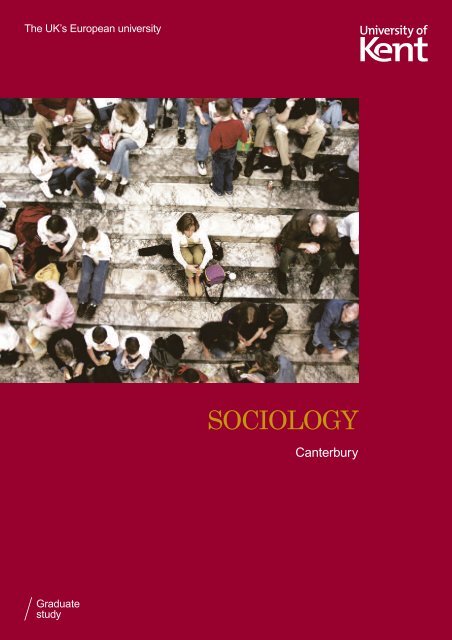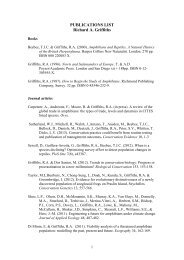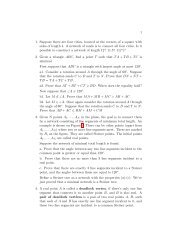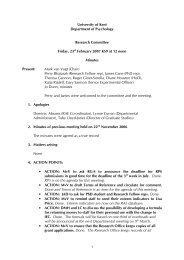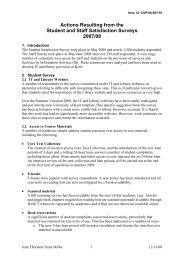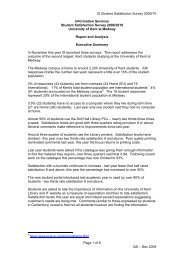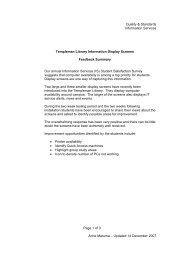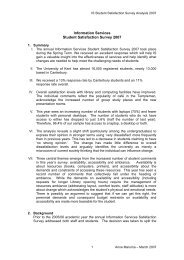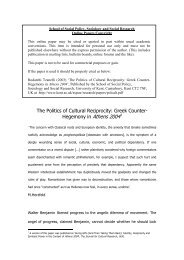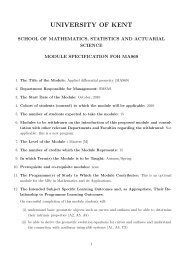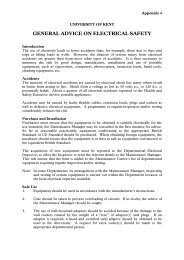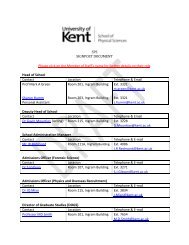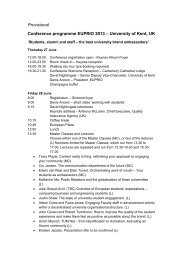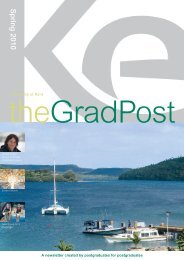Subject leaflet (pdf) - University of Kent
Subject leaflet (pdf) - University of Kent
Subject leaflet (pdf) - University of Kent
You also want an ePaper? Increase the reach of your titles
YUMPU automatically turns print PDFs into web optimized ePapers that Google loves.
The UK’s European university<br />
SOCIOLOGY<br />
Canterbury<br />
Graduate<br />
study
2<br />
Sociology<br />
INTRODUCTION<br />
The School <strong>of</strong> Social<br />
Policy, Sociology and<br />
Social Research (SSPSSR)<br />
at <strong>Kent</strong> is one <strong>of</strong> the top<br />
four research departments<br />
in its field in the UK.<br />
Renowned for its collegial<br />
culture, it is one <strong>of</strong> the<br />
largest and most diverse<br />
centres for social science<br />
in Europe.<br />
The School received top ratings in<br />
both the 2001 and 2008 Research<br />
Assessment Exercises. Our<br />
academics are recognised<br />
as world authorities, writing books<br />
and articles that define the fields in<br />
which they work, contributing to the<br />
formation and analysis <strong>of</strong> policy, and<br />
acting as leading commentators on<br />
contemporary social and cultural<br />
trends.<br />
Staff work within a variety <strong>of</strong><br />
intellectual and research traditions,<br />
employing a wide range <strong>of</strong><br />
methods, and are committed to<br />
providing a supportive environment<br />
for postgraduate students<br />
in sociology.<br />
Excellent research culture<br />
Members <strong>of</strong> the School have<br />
attracted large research funds (in<br />
excess <strong>of</strong> £12 million over the last<br />
five years) and have an enviable<br />
track record in gaining funding for<br />
PhD students. School staff take<br />
part in international symposia and<br />
research projects, and staff act as<br />
consultants and advisers to a wide<br />
variety <strong>of</strong> government departments,<br />
pr<strong>of</strong>essional organisations, research<br />
funding bodies and learned<br />
journals.<br />
Every postgraduate student<br />
in the School benefits from an<br />
unparalleled research culture,<br />
first-class teaching and individually<br />
tailored supervision. Ranked as<br />
one <strong>of</strong> the best UK centres <strong>of</strong><br />
excellence since research league<br />
tables began, we are part <strong>of</strong> the<br />
South East ESRC Doctoral Training<br />
Centre, and were, in 2011, awarded<br />
a prestigious EU Erasmus Mundus<br />
graduate programme. With<br />
academic and pr<strong>of</strong>essional seminar<br />
series, workshops and a Global<br />
Skills Award on <strong>of</strong>fer, plus the<br />
opportunity to work with dozens<br />
<strong>of</strong> world class academics, we<br />
welcome you to a unique academic<br />
environment dedicated to helping<br />
you realise your potential.<br />
The atmosphere in the School is<br />
informal and friendly, helped by<br />
excellent staff-to-student ratios<br />
and frequent international visitors.<br />
The lively and diverse postgraduate<br />
community is reflected by a<br />
broad and flourishing range <strong>of</strong><br />
staff/graduate seminars, workshops<br />
and study groups.<br />
Research Seminar Series<br />
The School hosts a weekly research<br />
seminar with invited speakers, which<br />
all postgraduate students are<br />
welcome to attend. Speakers are<br />
selected following suggestions<br />
from staff and students, and the<br />
seminars are usually followed by<br />
a social occasion. PhD and MPhil<br />
students attend a workshop series,<br />
where they present their work to<br />
each other and talk about various<br />
issues related to their research and<br />
their careers. There are also informal<br />
reading groups running in the<br />
School and across the <strong>University</strong>.<br />
Flexible and innovative<br />
programmes<br />
All our postgraduate programmes<br />
combine flexibility and coherence,<br />
and <strong>of</strong>fer you a first-class,<br />
advanced-level learning experience.<br />
Our taught Master’s degrees<br />
combine taught modules and a<br />
dissertation. At least half <strong>of</strong><br />
modules on taught programmes are<br />
options that allow you to construct<br />
your own specialist pathway on top<br />
<strong>of</strong> the disciplinary foundations we<br />
provide you with.<br />
Our taught programmes are also<br />
<strong>of</strong>fered on a two-year, part-time<br />
basis and as Postgraduate<br />
Diplomas – a nine-month,<br />
coursework-only programme –<br />
which allows you to choose the<br />
course most appropriate for your<br />
individual circumstances.<br />
“The School <strong>of</strong> Social Policy,<br />
Sociology and Social Research<br />
is an amazing community to<br />
be part <strong>of</strong>. Here, you can meet<br />
the people who are making a<br />
difference to the issues in<br />
sociology and social policy,<br />
who are writing the books,<br />
and who are stimulating<br />
the debates worldwide.”<br />
Jonathan Dean<br />
PhD Social Policy
www.kent.ac.uk/sspssr<br />
3<br />
Research programmes are also<br />
<strong>of</strong>fered in three formats: the oneyear<br />
MA by Research; the two-year<br />
MPhil; and the full doctoral<br />
programme leading to a PhD.<br />
Because we are a large and diverse<br />
school, we have the expertise to<br />
provide research supervision in a<br />
very wide range <strong>of</strong> topics across<br />
disciplinary and inter-disciplinary<br />
boundaries.<br />
Dedicated and<br />
inspirational teaching<br />
The School has a strong<br />
commitment to excellence in<br />
teaching. All lectures and seminars<br />
on postgraduate modules are<br />
informed by the latest research<br />
and scholarship, and are given<br />
by academic staff who are world<br />
leaders in their field. Our excellent<br />
staff-student ratio allows us to <strong>of</strong>fer<br />
small classes that are highly<br />
interactive and respond to students’<br />
interests. Our postgraduate<br />
teaching has regularly been<br />
commended by external<br />
independent assessors.<br />
Taught modules are based on<br />
lectures, seminars and individual<br />
work, and are each worth 20 credits.<br />
Students work closely with their<br />
supervisors on their dissertation, a<br />
piece <strong>of</strong> individual research worth<br />
60 credits. Assessment is entirely by<br />
coursework, consisting typically <strong>of</strong><br />
two essays, supplemented in some<br />
modules by seminar presentations,<br />
simulations and workshops.<br />
A supportive environment<br />
and a global outlook<br />
Based at an idyllic campus in the<br />
historic city <strong>of</strong> Canterbury, the<br />
School prides itself on the support<br />
it provides to its postgraduate<br />
students. Favoured by its strategic<br />
location – in a beautiful, green<br />
setting, within easy reach <strong>of</strong><br />
London, Brussels and Paris –<br />
the School is highly cosmopolitan<br />
in its outlook. We welcome a high<br />
proportion <strong>of</strong> international<br />
postgraduate students, conduct<br />
research across the world and<br />
challenge students to think globally<br />
in our classes.<br />
Funding and teaching<br />
opportunities<br />
The postgraduate programmes<br />
<strong>of</strong>fered by the School enjoy<br />
recognition from all main funding<br />
bodies. International applicants<br />
can apply to a variety <strong>of</strong> funding<br />
schemes such as the ‘Entente<br />
Cordiale’ studentships, while for UK<br />
and EU applicants the School has<br />
sustained considerable success in<br />
attracting Economic and Social<br />
Research Council (ESRC)<br />
studentship funding. In addition,<br />
each year the School <strong>of</strong>fers doctoral<br />
students a number <strong>of</strong> teaching<br />
scholarships. Granted on a<br />
competitive basis, these awards<br />
not only provide significant financial<br />
support but also <strong>of</strong>fer you the<br />
opportunity to acquire teaching<br />
experience – a crucial requirement<br />
if you are planning an academic<br />
career.<br />
WORLD-CLASS<br />
RESEARCH<br />
95% <strong>of</strong> SSPSSR’s research<br />
was judged ‘internationally<br />
significant’, according to the<br />
2008 Research Assessment<br />
Exercise (RAE).
4 Sociology<br />
STUDENT PROFILE<br />
Steve Roberts graduated<br />
with a degree in<br />
Industrial Relations<br />
and Human Resource<br />
Management and Social<br />
Policy, and is now<br />
studying for his PhD.<br />
Why did you choose <strong>Kent</strong>?<br />
It is local to me and has a very good<br />
reputation, and I felt it would <strong>of</strong>fer<br />
me the best opportunities going<br />
forward. For my undergraduate<br />
degree, I chose to study a business<br />
subject as I had some experience<br />
working in the retail industry.<br />
However, in the first year <strong>of</strong> the<br />
course, I took some wild modules<br />
in sociology and social policy, which<br />
I really enjoyed. So I decided to<br />
change my degree to a joint<br />
honours in Industrial Relations and<br />
Human Resource Management and<br />
Social Policy.<br />
The idea <strong>of</strong> doing a research<br />
degree came about during a lecture<br />
in my third year when I remember<br />
noting that the topic we were<br />
discussing could make a good<br />
research project. I approached the<br />
lecturer to discuss the viability <strong>of</strong><br />
the project and she thought it was a<br />
good idea and that I was a suitable<br />
candidate to supervise – and here I<br />
am, four years later, in my final year<br />
<strong>of</strong> a PhD.<br />
What are you researching?<br />
Broadly speaking, I’m researching<br />
youth sociology. More specifically,<br />
I’m looking at the transitions <strong>of</strong><br />
young men from youth to adulthood,<br />
who are unaccounted for in the<br />
quality targets (ie who are not in<br />
education or in employment).<br />
How is it going?<br />
It’s going very well. There was a<br />
noticeable jump from undergraduate<br />
studies in terms <strong>of</strong> expectations<br />
and output, but you are more<br />
intellectually stimulated and<br />
challenged as a postgraduate<br />
student. As you progress with<br />
your research, you reach a level<br />
where you feel comfortable to have<br />
discussions with the academics<br />
and become really involved in the<br />
intellectual debates – you really feel<br />
you are part <strong>of</strong> the School.<br />
I do some seminar teaching as part<br />
<strong>of</strong> my role as a research student<br />
and I love it! It’s great preparation<br />
for presenting your research at<br />
conferences and is also affirmation<br />
<strong>of</strong> how much you actually know.<br />
Teaching demonstrates to you<br />
that your years <strong>of</strong> being an<br />
undergraduate student have taught<br />
you something significant and you<br />
can share that with someone else.<br />
I also get a real buzz from knowing<br />
that my students are performing<br />
and developing well.<br />
How have you found the<br />
supervision process?<br />
It’s excellent. My supervisor is very<br />
pragmatic, but quite laid back and<br />
that was an important fit for me. She<br />
<strong>of</strong>fers advice but lets me write my<br />
own project. However, I’m always<br />
aware that she is the pr<strong>of</strong>essor and<br />
I respect and value her opinion. She<br />
is also very supportive, especially in<br />
terms <strong>of</strong> encouraging me to attend<br />
conferences and putting forward<br />
opportunities for me. I think we have<br />
a very good working understanding<br />
– she thinks I’m a good student and<br />
I think she’s a good supervisor.<br />
How would you describe your<br />
fellow research students?<br />
Everyone has a really strong and<br />
diverse range <strong>of</strong> research interests<br />
which makes working in the School<br />
fascinating. SSPSSR students come<br />
from all over the world, they have<br />
different ideas and, intellectually,<br />
they are very high-level and on top<br />
<strong>of</strong> their game. We work in a highpr<strong>of</strong>ile<br />
School, so it carries that<br />
expectation.<br />
How have you funded your<br />
studies?<br />
I’m funded through the Economic<br />
and Social Research Council<br />
(ESRC), which held an internal<br />
competition at the time. As the<br />
School has a high research rating,<br />
several funded PhD positions were<br />
guaranteed and applications were
www.kent.ac.uk/sspssr<br />
5<br />
invited from all over the UK – and I<br />
got one <strong>of</strong> those. For me, it was a<br />
straightforward process and the<br />
administration was very simple.<br />
I wrote an outline <strong>of</strong> my proposal<br />
and my supervisor completed the<br />
reference section – in many ways,<br />
it was a lot like filling out a job<br />
application.<br />
What support do you receive?<br />
Aside from the support I receive<br />
from my supervisor and the School<br />
more generally, the Graduate School<br />
<strong>of</strong>fers many transferable skills<br />
training opportunities, which is<br />
fantastic. The courses and<br />
workshops are really wide-ranging<br />
and cover more than just academic<br />
skills, for example, media training<br />
as well as writing and presentation<br />
skills. Students should take<br />
advantage <strong>of</strong> the resources<br />
available and learn as much<br />
as they can.<br />
What’s next for you?<br />
I have friends who have completed<br />
their PhDs and have gone on to<br />
work in the public sector, for<br />
example, in local government.<br />
However, there’s not a strong<br />
relationship between their original<br />
research topics and the work<br />
they have gone on to do. For me,<br />
doing a PhD is, in essence, an<br />
apprenticeship for academic life. In<br />
an ideal word, I’d like to become a<br />
university lecturer, so the next step<br />
is, hopefully, to secure additional<br />
funding and get a postdoctoral<br />
fellowship.<br />
Do you have any advice to <strong>of</strong>fer<br />
potential research students?<br />
It might seem obvious, but it’s really<br />
important to establish a good fit with<br />
your supervisor or supervisory<br />
team. Once you’ve identified a<br />
potential supervisor, get in touch<br />
with them before you begin the<br />
application process and try to<br />
establish a relationship and get<br />
them on side. Other than that, try<br />
to do as well as you can in your<br />
undergraduate studies – if you<br />
want to have a chance <strong>of</strong> securing<br />
funding, you need to have a good<br />
degree result. Explore all <strong>of</strong> the<br />
funding options too, as there are lots<br />
<strong>of</strong> opportunities. The ESRC has an<br />
open national competition and the<br />
<strong>University</strong> <strong>of</strong>fers scholarships as<br />
well. I was determined to pursue my<br />
PhD even if I didn’t get the funding<br />
and I think that put me in a better<br />
position to write a successful<br />
funding proposal. I think that shows<br />
a high level <strong>of</strong> conviction, not only to<br />
the funding provider, but also to your<br />
supervisor.<br />
KENT GRADUATE<br />
SCHOOL<br />
Based on the Canterbury<br />
campus, the Graduate School<br />
is a <strong>University</strong>-wide resource<br />
available to all postgraduate<br />
students.
6<br />
Sociology<br />
EXCELLENT CAREER PROSPECTS<br />
A postgraduate<br />
qualification from <strong>Kent</strong><br />
opens up a wealth <strong>of</strong><br />
career opportunities by<br />
providing an impressive<br />
portfolio <strong>of</strong> skills and<br />
specialist knowledge.<br />
As well as providing a first-rate<br />
academic experience, we want<br />
you to be in a good position to face<br />
the demands <strong>of</strong> a tough economic<br />
environment. Employers recognise<br />
that a postgraduate qualification<br />
demonstrates a wide range <strong>of</strong><br />
skills. At <strong>Kent</strong>, we provide a<br />
comprehensive package <strong>of</strong> skills<br />
development training programmes,<br />
careers advice, and volunteering<br />
and paid work opportunities to help<br />
enhance your career prospects.<br />
Skills training<br />
During your programme, you<br />
acquire a high level <strong>of</strong> academic<br />
knowledge and specialist practical<br />
skills. <strong>Kent</strong> also helps you to develop<br />
key transferable skills that are<br />
essential within the competitive<br />
world <strong>of</strong> postgraduate employment,<br />
such as the ability to adapt to<br />
challenges, analyse complex realworld<br />
problems and develop original<br />
ideas that can be applied to all<br />
aspects <strong>of</strong> employment.<br />
The Graduate School<br />
The Graduate School co-ordinates<br />
the Transferable Skills Training<br />
programme for research students,<br />
in which you can access a wide<br />
range <strong>of</strong> lectures and workshops.<br />
These provide training, personal<br />
development planning and career<br />
development skills. The Graduate<br />
School also delivers the Global Skills<br />
Award programme for students<br />
following taught programmes <strong>of</strong><br />
study, which is specifically designed<br />
to consolidate your awareness <strong>of</strong><br />
current global issues and improve<br />
your employment prospects.<br />
Exciting career options<br />
<strong>Kent</strong> has an excellent record for<br />
postgraduate employment: over<br />
90% <strong>of</strong> our postgraduate students<br />
who graduated in 2010 found a job<br />
or further study opportunity within<br />
six months. We constantly monitor<br />
how well our programmes meet the<br />
demands <strong>of</strong> today’s increasingly<br />
competitive and globalised job<br />
market.<br />
Possessing a taught Master’s<br />
degree is now <strong>of</strong>ten a requirement<br />
in a wide range <strong>of</strong> challenging and<br />
rewarding positions. A Master’s in<br />
Sociology or in Social Research is<br />
a particularly valuable and flexible<br />
qualification. Postgraduate students<br />
in our programmes develop their<br />
skills in thinking and communicating<br />
about social issues that are relevant<br />
to a range <strong>of</strong> exciting careers in<br />
many pr<strong>of</strong>essions such as the civil<br />
service, public sector organisations,<br />
European and international<br />
organisations, NGOs, journalism<br />
and broadcasting, and business<br />
and consultancy. Skills in the<br />
collection and analysis <strong>of</strong>, and<br />
reflection on, data <strong>of</strong> various kinds<br />
are especially valuable for careers<br />
in market research, marketing,<br />
survey research, evaluation and<br />
consultancy. <strong>Kent</strong> postgraduates<br />
have a strong track record in this<br />
respect, with many <strong>of</strong> them now<br />
occupying top positions with<br />
employers in the public and<br />
private sectors.<br />
A Master’s in Political Sociology<br />
or Environmental Social Science<br />
allows postgraduate students to<br />
have greater specialisms, attaining<br />
skills, competence and knowledge<br />
to pursue a range <strong>of</strong> exciting<br />
careers in civil society, NGOs,<br />
public sector, research<br />
organisations and consultancy.<br />
Careers Advisory Service<br />
Our Careers Advisory Service can<br />
help you to plan for your future by<br />
providing one-to-one advice at any<br />
stage in your postgraduate studies.<br />
It also provides online advice on<br />
employability skills, career choices<br />
and applications, and interview<br />
skills.<br />
Further information<br />
For more information on the careers<br />
help we provide at <strong>Kent</strong>, visit our<br />
Employability web page at<br />
www.kent.ac.uk/employability
www.kent.ac.uk/sspssr<br />
7<br />
GRADUATE PROFILE<br />
Sarah Evans was awarded<br />
a PhD from <strong>Kent</strong> and is<br />
now working as a curator<br />
for the British Library.<br />
Why did you choose <strong>Kent</strong>?<br />
<strong>Kent</strong> has a really good reputation<br />
for Sociology and for teaching at<br />
postgraduate level; the School <strong>of</strong><br />
Social Policy, Sociology and Social<br />
Research is known to engage<br />
critically with a range <strong>of</strong> subjects<br />
and approaches. The work <strong>of</strong><br />
several <strong>of</strong> the academics<br />
connected well with my own<br />
research interests and the thought<br />
<strong>of</strong> learning from people with their<br />
knowledge, experience and outlook<br />
really appealed to me.<br />
I also wanted to be close to London<br />
(my hometown) but to enjoy the<br />
benefits <strong>of</strong> living on campus and<br />
being able to easily access the<br />
resources I’d need for my research.<br />
What did you research?<br />
My PhD examined the aspirations<br />
<strong>of</strong> working-class girls with respect<br />
to higher education. It was an<br />
ethnography <strong>of</strong> progress through<br />
education and aimed to examine<br />
the intersections <strong>of</strong> gender, social<br />
class and ethnicity in affecting<br />
educational outcomes. My<br />
supervisor was extremely<br />
supportive and provided excellent<br />
suggestions, advice and feedback.<br />
I also had the opportunity to<br />
regularly attend conferences at<br />
other universities and present<br />
papers.<br />
During the first year <strong>of</strong> my PhD,<br />
I also completed a Postgraduate<br />
Certificate in Social Research<br />
Methods. This course was very<br />
useful in preparing me for the<br />
empirical research component <strong>of</strong><br />
my PhD project and helped me to<br />
explore different possible<br />
approaches.<br />
What are you doing now?<br />
I am currently a curator in social<br />
science at the British Library and<br />
work specifically with the collections<br />
in sociology. Part <strong>of</strong> my remit is to<br />
improve access to the sociology<br />
collections by researchers and<br />
academics and also to encourage<br />
collaborative research. I work<br />
closely with HEIs to organise<br />
conferences and seminars and<br />
to develop ideas for research<br />
proposals.<br />
I have spent the last two and a<br />
half years learning about the social<br />
science collections here at the<br />
British Library, developing the<br />
resources in my area and promoting<br />
them to researchers. The work is<br />
very varied and has allowed me<br />
to maintain a high level <strong>of</strong> contact<br />
with my areas <strong>of</strong> interest – the<br />
knowledge gained during my PhD<br />
has been vitally important for this<br />
role.<br />
What are you planning to do<br />
next?<br />
I hope to continue to develop my<br />
research pr<strong>of</strong>ile and to lead a<br />
collaborative research project which<br />
will bring benefits to both the British<br />
Library and the social science<br />
research community.<br />
Finally, what advice would you<br />
give to someone thinking <strong>of</strong><br />
coming to <strong>Kent</strong>?<br />
It’s worthwhile visiting the campus<br />
during term-time to get a feel for the<br />
place. Canterbury is a lovely place<br />
to live as a student – do spend<br />
some time wandering through the<br />
city and trying the pretty (but steep!)<br />
walk up to campus!<br />
IMPRESSIVE<br />
CAREER<br />
PROSPECTS<br />
<strong>Kent</strong> has an excellent<br />
postgraduate employment<br />
record: over 90% <strong>of</strong> our<br />
postgraduate students who<br />
graduated in 2010 found a job<br />
or further study opportunity<br />
within six months.
8<br />
Sociology<br />
TAUGHT PROGRAMMES<br />
There are four taught<br />
postgraduate programmes<br />
on <strong>of</strong>fer. Below is an<br />
explanation <strong>of</strong> what each<br />
degree programme <strong>of</strong>fers.<br />
Sociology MA<br />
The MA in Sociology provides<br />
a comprehensive overview and<br />
analysis <strong>of</strong> the foundational<br />
concerns and current debates in<br />
sociology, and <strong>of</strong>fers a critical and<br />
inter-disciplinary perspective on<br />
contemporary issues. This includes<br />
a series <strong>of</strong> reflections on competing<br />
international visions and possible<br />
futures for the discipline. The<br />
programme also aims to investigate<br />
the ways in which global institutional<br />
transformations are reshaping the<br />
world <strong>of</strong> the 21st century, and the<br />
implications this holds for<br />
sociological thinking and research.<br />
Course content<br />
Core modules<br />
• Contemporary Social Theory<br />
• Foundations <strong>of</strong> Sociology<br />
• Dissertation<br />
You then choose four from the<br />
following options:<br />
• Comparative Social Policy<br />
• Cultural Criminology<br />
• Design, Philosophy and Ethics<br />
<strong>of</strong> Social Enquiry<br />
• Environmental Politics<br />
• Gender, Crime and Criminal<br />
Justice<br />
• Key Issues in Comparative Social<br />
Policy<br />
• Qualitative Research<br />
• Quantitative Analysis<br />
• Organised Civil Society and the<br />
Third Sector<br />
• Race, Difference and Belonging<br />
• Religion and Social Theory<br />
• Social and Political Movements<br />
• Social Science Perspectives on<br />
Environmental Issues<br />
• Social Suffering<br />
• Sociology <strong>of</strong> Violence<br />
• Techniques <strong>of</strong> Data Analysis<br />
• Terrorism and Modern Society<br />
• Theories <strong>of</strong> Crime and Deviance<br />
• Worlds <strong>of</strong> Work<br />
• Young People, Crime and Place.<br />
Assessment<br />
Assessment is by coursework and<br />
the dissertation.<br />
Methods <strong>of</strong> Social<br />
Research MA<br />
This programme aims to develop<br />
your skills in planning, carrying out,<br />
writing up and appraising research<br />
and to introduce you to the main<br />
techniques for qualitative and<br />
quantitative research, including<br />
conducting surveys, interviewing,<br />
running focus groups, using life<br />
history and observational<br />
techniques, and analysing data.<br />
The course also provides a base<br />
“The Sociology programmes<br />
at <strong>Kent</strong> provide advanced<br />
training, focusing in<br />
particular on contemporary<br />
theories, methods, themes and<br />
debates. You will be part <strong>of</strong> a<br />
large, international, vibrant<br />
postgraduate community and<br />
SSPSSR is one <strong>of</strong> the country’s<br />
top social science research<br />
Schools. We will introduce<br />
to emerging debates that<br />
are shaped by the very staff<br />
who will be teaching you.”<br />
Pr<strong>of</strong>essor Larry Ray<br />
Pr<strong>of</strong>essor <strong>of</strong> Sociology
www.kent.ac.uk/sspssr<br />
9<br />
the interaction among social and<br />
political institutions, processes and<br />
collective action, and is distinctive<br />
in its focus on social and political<br />
movements, protest, and the less<br />
conventional and institutionalised<br />
forms <strong>of</strong> political action and<br />
participation, environmental<br />
politics and globalisation.<br />
for students who are going on to<br />
do an MPhil or PhD by research.<br />
Similarly, it may be valuable if you<br />
commission or manage social<br />
research or use findings from<br />
research projects in your<br />
pr<strong>of</strong>essional life.<br />
Course content<br />
Core modules<br />
• Design, Philosophy and Ethics <strong>of</strong><br />
Social Enquiry<br />
• Qualitative Research<br />
• Quantitative Analysis<br />
• Techniques <strong>of</strong> Data Analysis<br />
• Dissertation<br />
You then choose two from the<br />
following options:<br />
• Comparative Social Policy<br />
• Contemporary Social Theory<br />
• Cultural Criminology<br />
• Environmental Politics<br />
• Foundations <strong>of</strong> Sociology<br />
• Fundraising and Philanthropy<br />
• Organised Civil Society and the<br />
Third Sector<br />
• Race, Difference and Belonging<br />
• Religion and Social Theory<br />
• Research Methods in Criminology<br />
• Social and Political Movements<br />
• Social Science Perspectives on<br />
Environmental Issues<br />
• Social Suffering<br />
• Sociology <strong>of</strong> Violence<br />
• Terrorism and Modern Society<br />
• Theories <strong>of</strong> Crime and Deviance<br />
• Worlds <strong>of</strong> Work<br />
• Young People, Crime and Place.<br />
The above are modules available<br />
within the School. You may also take<br />
options in Anthropology, Law, and<br />
International Relations and Politics,<br />
or other suitable courses depending<br />
on their interests, with the approval<br />
<strong>of</strong> the programme’s Director <strong>of</strong><br />
Studies.<br />
Assessment<br />
Assessment is by coursework and<br />
the dissertation.<br />
Political Sociology MA<br />
The MA in Political Sociology<br />
combines sociology and political<br />
science to address key issues<br />
<strong>of</strong> social and political change<br />
in modern societies. It examines<br />
Course content<br />
Core modules<br />
• Environmental Politics<br />
• Social and Political Movements<br />
• Dissertation<br />
You then choose four from the<br />
following options:<br />
• Comparative Social Policy<br />
• Conflict and Violence<br />
• Contemporary Social Theory<br />
• Cultural Criminology<br />
• Design, Philosophy and Ethics <strong>of</strong><br />
Social Research<br />
• Foundations <strong>of</strong> Sociology<br />
• Human Rights in a World <strong>of</strong><br />
States<br />
• Qualitative Research<br />
• Quantitative Analysis<br />
• Organised Civil Society and the<br />
Third Sector<br />
• Race, Difference and Belonging<br />
• Religion and Social Theory<br />
• Resistance and Alternatives to<br />
Capitalism and Democracy<br />
• Social Science Perspectives on<br />
Environmental Issues<br />
• Social Suffering<br />
• Sociology <strong>of</strong> Violence<br />
• Terrorism and Modern Society<br />
• Worlds <strong>of</strong> Work<br />
• Young People, Crime and Place.<br />
Most <strong>of</strong> above are modules<br />
available within the School.<br />
CONTINUED OVERLEAF
10<br />
Sociology<br />
TAUGHT PROGRAMMES (CONT)<br />
You may also take options in<br />
Anthropology, Law, and International<br />
Relations and Politics, or other<br />
suitable courses depending on their<br />
interests, with the approval <strong>of</strong> the<br />
programme’s Director <strong>of</strong> Studies.<br />
Assessment<br />
Assessment is by coursework and<br />
the dissertation.<br />
Environmental Social<br />
Science MSc<br />
The MSc in Environmental Social<br />
Science provides you with an<br />
understanding <strong>of</strong> the perspectives<br />
and contributions <strong>of</strong> social science<br />
to the understanding and resolution<br />
<strong>of</strong> environmental issues. It draws<br />
upon expertise from several schools<br />
in the Faculty <strong>of</strong> Social Sciences,<br />
and the contributions <strong>of</strong> teachers<br />
who are international leaders in their<br />
fields, to provide a broad multidisciplinary<br />
perspective accessible<br />
to students from a wide range <strong>of</strong><br />
academic backgrounds.<br />
Course content<br />
Core modules<br />
• Research module (Qualitative<br />
Research, Quantitative Analysis<br />
or Techniques <strong>of</strong> Data Analysis)<br />
• Social Science Perspectives on<br />
Environmental Issues<br />
• Dissertation<br />
You then choose four from the<br />
following options:<br />
• Climate Change and Renewable<br />
Energy Law<br />
• Conflict and Violence<br />
• Conservation and Natural<br />
Resources Law<br />
• Contemporary Social Theory<br />
• Environmental Anthropology<br />
• Environmental Quality Law<br />
• Environmental Politics<br />
• Ethnobiological Knowledge<br />
Systems<br />
• European Union Environmental<br />
Law and Policy<br />
• Foundations <strong>of</strong> Sociology<br />
• Human Rights in a World <strong>of</strong><br />
States<br />
• International Environmental Law –<br />
Legal Foundations<br />
• International Trade Law and the<br />
Environment<br />
• Land Development Law<br />
• The Legal Foundations <strong>of</strong><br />
Environmental Decision Making<br />
• Organised Civil Society and the<br />
Third Sector<br />
• Religion and Social Theory<br />
• Resistance and Alternatives to<br />
Capitalism and Democracy<br />
• Social and Political Movements<br />
• Social Suffering<br />
• Sociology <strong>of</strong> Violence.<br />
The above are available from several<br />
schools (including Anthropology,<br />
Law, and International Relations<br />
and Politics) in the Faculty <strong>of</strong><br />
Social Sciences. You may also take<br />
other options depending on your<br />
interests, with the approval <strong>of</strong> the<br />
programme’s Director <strong>of</strong> Studies.<br />
“Political Sociology at <strong>Kent</strong><br />
<strong>of</strong>fers a rich diversity <strong>of</strong><br />
options with a distinctive<br />
concentration on social<br />
and political movements,<br />
protests and resistance and<br />
provides students a distinctive<br />
perspective on the role <strong>of</strong> the<br />
social sciences in addressing<br />
some <strong>of</strong> the most urgent issues<br />
<strong>of</strong> our time.”<br />
Pr<strong>of</strong>essor Christopher Rootes<br />
Pr<strong>of</strong>essor <strong>of</strong> Environmental Politics<br />
and Political Sociology
www.kent.ac.uk/sspssr<br />
11<br />
TAUGHT MODULES<br />
Below is a selection <strong>of</strong><br />
the modules currently<br />
<strong>of</strong>fered on the taught<br />
postgraduate<br />
programmes.<br />
Contemporary Social<br />
Theory<br />
This module surveys key<br />
contributions to social theory in<br />
the past decades. We use texts<br />
from some <strong>of</strong> the most original<br />
scholars in sociology, anthropology,<br />
philosophy and literature to<br />
systematically reflect on the<br />
approaches and concepts we can<br />
use to understand how the social<br />
world works, how it changes and<br />
how we can know and study it.<br />
Cultural Criminology<br />
This module is concerned<br />
with highlighting debates and<br />
approaches to contemporary<br />
culture and popular culture, with<br />
a particular emphasis on issues<br />
<strong>of</strong> conflict and criminality, while<br />
examining the connections between<br />
crime and contemporary forms <strong>of</strong><br />
communication systems using a<br />
framework provided by cultural<br />
criminology. Particularly, you<br />
examine how governments seek<br />
to control culture and popular<br />
pleasures, especially youth cultures.<br />
Design Philosophy and<br />
Ethics <strong>of</strong> Social Enquiry<br />
This module introduces key issues<br />
and problems in the process <strong>of</strong><br />
philosophy, design and ethics <strong>of</strong><br />
social enquiry. You are taught to<br />
think about the assumptions you<br />
are making when you do social<br />
research as well as a set <strong>of</strong><br />
practical techniques for carrying<br />
out your own research. By the end<br />
<strong>of</strong> the module, you should be able<br />
write good research proposals,<br />
carry out research projects and<br />
critique the research <strong>of</strong> others.<br />
Environmental Politics<br />
This module is particularly<br />
concerned with the forms<br />
and outcomes <strong>of</strong> the political<br />
contention and mobilisation<br />
around environmental issues,<br />
ranging from pressure groups,<br />
formal environmental movement<br />
organisations and Green parties<br />
to local environmental activism and<br />
radical environmental protest. It also<br />
considers the relationship between<br />
democracy and the environment:<br />
is democracy good for the<br />
environment? Would more<br />
deliberative forms <strong>of</strong> democracy<br />
improve matters? The approach is<br />
cross-nationally comparative and<br />
also considers issues <strong>of</strong> global<br />
environmental politics.<br />
Foundations <strong>of</strong> Sociology<br />
This module is designed to provide<br />
a guide to the foundations <strong>of</strong><br />
sociology by exploring the most<br />
influential traditions <strong>of</strong> writing in<br />
the discipline and examining how<br />
these were forged on the basis <strong>of</strong><br />
an ongoing dialogue with the legacy<br />
<strong>of</strong> the Enlightenment. While most<br />
sessions are concerned with<br />
debating the dominant theoretical<br />
interests that have defined the<br />
discipline, others are devoted to<br />
investigating key junctures in the<br />
development <strong>of</strong> methodology and<br />
research practice. The module aims<br />
to provide you with critical insights<br />
into the ways in which sociology has<br />
been configured as a discipline in<br />
response to key junctures in its<br />
history.<br />
Gender, Crime and<br />
Criminal Justice<br />
In this module, you explore<br />
theoretical approaches to<br />
criminology and their engagement<br />
with gender. You examine the<br />
feminist critique <strong>of</strong> mainstream<br />
criminology and patterns <strong>of</strong><br />
<strong>of</strong>fending and victimisation<br />
by gender, with a focus on<br />
subjects such as pornography,<br />
prostitution, violence (including<br />
homicide/femicide), masculinities,<br />
<strong>of</strong>fending behaviour and media<br />
representations <strong>of</strong> women and<br />
crime. Issues relating to<br />
methodology and policy<br />
are discussed throughout.<br />
Qualitative Research<br />
This module focuses on the various<br />
aspects <strong>of</strong> using and collecting<br />
qualitative data. This module is<br />
divided into three sections, each<br />
dealing with a broad type <strong>of</strong><br />
qualitative data collection. Each<br />
method will be discussed both in<br />
terms <strong>of</strong> ‘theory’ as well as more<br />
practical issues involved in<br />
collecting the data. Firstly, you focus<br />
on different types <strong>of</strong> ‘interviewing’<br />
as a form <strong>of</strong> data collection, looking<br />
at surveys, interviews, focus groups<br />
and oral history methods. You are<br />
then presented with the foundations<br />
<strong>of</strong> ethnographic methods in theory<br />
and practice. Finally, you examine a<br />
selection <strong>of</strong> qualitative methods
12<br />
Sociology<br />
TAUGHT MODULES (CONT)<br />
based on the hermeneutic tradition,<br />
including textual analysis, critical<br />
discourse analysis and visual<br />
methods.<br />
Quantitative Analysis<br />
This module provides a general<br />
introduction to statistical tools for<br />
social scientists: data collection;<br />
organising and presenting data;<br />
descriptive statistics; probability<br />
distributions: discrete probability<br />
distribution, continuous probability<br />
distribution; sampling methods and<br />
distributions; hypotheses testing;<br />
analysis <strong>of</strong> variance; correlation<br />
analysis; linear regression; multiple<br />
regression; non-parametric<br />
methods; and computer solutions<br />
using statistical s<strong>of</strong>tware packages<br />
(Excel, R and Stata).<br />
Social and Political<br />
Movements<br />
This module focuses upon the<br />
development <strong>of</strong> social and political<br />
movements. It introduces theories<br />
<strong>of</strong> collective action and social<br />
movements and examines them<br />
in relation to case studies selected<br />
with students' interests in mind.<br />
Social Science<br />
Perspectives on<br />
Environmental Issues<br />
This module aims to widen your<br />
knowledge <strong>of</strong> a variety <strong>of</strong> topical<br />
and/or scientifically important or<br />
controversial environmental issues,<br />
to encourage you to look at<br />
environmental studies from the<br />
perspectives <strong>of</strong> the several social<br />
science disciplines (anthropology,<br />
law, political science, social policy<br />
and sociology), to make<br />
connections between questions<br />
stimulated by your own disciplinary<br />
background and those raised in the<br />
module, and to reflect critically upon<br />
the advantages and limitations <strong>of</strong><br />
the various perspectives. It covers a<br />
variety <strong>of</strong> topics, which are likely to<br />
include: the nature <strong>of</strong> environmental<br />
issues; the social construction <strong>of</strong><br />
risk and the precautionary principle;<br />
global warming, climate change<br />
and energy policy; the rise <strong>of</strong><br />
environmental consciousness<br />
and environmentalism; food and<br />
agriculture; environmental policy<br />
and regulation; environmental policy<br />
and law; ecotourism; ecology and<br />
development; traditional societies<br />
and sustainability.<br />
Social Suffering<br />
This module examines how the<br />
concept <strong>of</strong> ‘social suffering’ has<br />
been widely adopted in social<br />
science as a means to refer us<br />
to lived experiences <strong>of</strong> pain,<br />
damage, injury, deprivation and<br />
loss. Here it is generally understood<br />
that human afflictions are<br />
encountered in multiple forms and<br />
that their deleterious effects are<br />
manifold; but a particular emphasis<br />
is brought to bear upon the extent to<br />
which social processes and cultural<br />
conditions both constitute and<br />
moderate the ways in which human<br />
suffering is experienced and<br />
expressed.<br />
Sociology <strong>of</strong> Violence<br />
This module explores the ways<br />
in which violence is understood<br />
in social science research, and<br />
provides advanced discussion <strong>of</strong><br />
the major theoretical and research<br />
themes involved in the analysis <strong>of</strong><br />
violence. You critically examine<br />
data on the prevalence, nature<br />
and effects <strong>of</strong> violent crime,<br />
and consider issues <strong>of</strong> violence,<br />
aggression and masculinity, with
www.kent.ac.uk/sspssr<br />
13<br />
particular reference to examples,<br />
such as racist crime, homophobic<br />
crime and domestic violence. The<br />
module approaches violence from<br />
both interpersonal and societal<br />
perspectives and includes<br />
consideration <strong>of</strong> collective violence<br />
and genocide. It further examines<br />
solutions to violence and conflict<br />
resolution, the effects <strong>of</strong> intervention<br />
strategies and non-juridical<br />
responses to violence.<br />
Techniques <strong>of</strong> Data<br />
Analysis<br />
This module introduces you<br />
to several basic, non-statistical<br />
techniques for analysing data.<br />
Example topics include grounded<br />
theory, content analysis, social<br />
network analysis and scale<br />
construction.<br />
Terrorism and Modern<br />
Society<br />
Following the events <strong>of</strong> September<br />
11 2001, public concerns<br />
surrounding the related threats<br />
associated with terrorism have<br />
inevitably deepened. This module<br />
provides a general introduction to<br />
terrorism and poses a series <strong>of</strong><br />
questions that rarely feature in<br />
mainstream criminological and<br />
sociological discourse. A central<br />
module is an examination <strong>of</strong> the<br />
actual risk posed by international<br />
terrorism and whether or not the<br />
threat is enhanced by the fears and<br />
anxieties generated by a risk-averse<br />
culture.<br />
Worlds <strong>of</strong> Work<br />
This module examines the way work<br />
shapes society and, in turn, how<br />
society shapes work. Incorporating<br />
concepts from sociology, cultural<br />
studies, social policy and other<br />
disciplines, the module explores<br />
work in a variety <strong>of</strong> competing and<br />
complementary ways. In so doing,<br />
it allows you to explore different<br />
themes, issues, methodologies<br />
and approaches. These include:<br />
the division <strong>of</strong> labour in society,<br />
work identity and meaning; bodies<br />
at work; age, generation and class;<br />
visual methods and approaches;<br />
the cultures <strong>of</strong> work; and the end<br />
<strong>of</strong> work.<br />
Young People, Place and<br />
Crime<br />
This module provides you with a<br />
sociological and criminological<br />
understanding <strong>of</strong> contemporary<br />
issues relating to youth crime. More<br />
specifically, it focuses on a critical<br />
understanding <strong>of</strong> young people’s<br />
involvement in crime and deviance<br />
and the various responses to youth<br />
crime, especially how young people<br />
are dealt with by the youth justice<br />
system. You look in depth at four<br />
key substantive themes: young<br />
people and gangs; young people<br />
and nightlife; young people and<br />
criminal damage; and the youth<br />
justice system in England and<br />
Wales. Throughout the module,<br />
attention is given to the importance<br />
<strong>of</strong> understanding the connections<br />
<strong>of</strong> youth crime with race, class and<br />
gender, and engages with<br />
theoretical ideas and debates<br />
that inform our understandings<br />
<strong>of</strong> youth crime.
14 Sociology<br />
RESEARCH DEGREES<br />
Research in Sociology at<br />
<strong>Kent</strong> covers a range <strong>of</strong><br />
areas including social<br />
and critical theory, social<br />
movements, globalisation<br />
and everyday life, cities<br />
and space, media and<br />
technology, class, race<br />
and ethnicity, gender,<br />
work, visual sociology,<br />
the welfare state, risk and<br />
society, violence, NGOs<br />
and organisations, and<br />
social aspects <strong>of</strong> the body.<br />
We can <strong>of</strong>fer high-quality<br />
supervision across a wide range<br />
<strong>of</strong> areas and we work very carefully<br />
to match you with a supervisor that<br />
suits your interests and ambitions.<br />
There are further details on the<br />
research activities and publications<br />
<strong>of</strong> individual members <strong>of</strong> staff and<br />
the School’s research units on the<br />
School’s website. In addition to<br />
regular meetings with individual<br />
supervisors, all research students<br />
take part in a research training<br />
programme.<br />
Research areas<br />
Academic staff at <strong>Kent</strong> share<br />
a number <strong>of</strong> interests, which<br />
have been grouped here for your<br />
guidance. However, there is <strong>of</strong>ten a<br />
degree <strong>of</strong> overlap between groups<br />
and your research project does not<br />
have to fall neatly within any one <strong>of</strong><br />
them. The School also has several<br />
research centres which bring<br />
together experts in the field,<br />
co-ordinate research, organise<br />
talks and <strong>of</strong>fer opportunities for<br />
postgraduate students to get<br />
involved in discussions and<br />
research projects.<br />
The Analysis <strong>of</strong> Social<br />
Movements<br />
Social and political changes have<br />
stimulated new forms <strong>of</strong> political<br />
participation and mobilisation,<br />
including waves <strong>of</strong> protest, new<br />
social movement organisations<br />
focused on old as well as new<br />
issues, new political parties, and<br />
global social movements. Staff<br />
interests include environmental<br />
movements, humanitarian NGOs,<br />
elite networks, and the ‘postmodern’<br />
politics <strong>of</strong> anti-communist<br />
movements in Eastern Europe.<br />
Crime, Control and Culture<br />
Members <strong>of</strong> the crime, control<br />
and culture research cluster at<br />
<strong>Kent</strong> are primarily involved in<br />
projects and research centred<br />
activities connected with cultural<br />
criminology, for example in the<br />
areas <strong>of</strong> subcultures, drug-use<br />
and intoxification, the night time<br />
economy, the surveillance society,<br />
the photographic representation <strong>of</strong><br />
crime, young people and crime, and<br />
the carnival <strong>of</strong> crime. In addition,<br />
work <strong>of</strong> a more traditional nature is<br />
also being undertaken, for example<br />
in the fields <strong>of</strong>: international drug<br />
policy, the history <strong>of</strong> crime and<br />
punishment, and violence.<br />
Cross-national and European<br />
Social Policy<br />
Cross-national study, both among<br />
staff and postgraduate students,<br />
is widespread throughout the<br />
School and relevant to all groupings.<br />
However, there is also research<br />
which takes cross-national<br />
comparison as its major focus. This<br />
includes analysing policy formation<br />
and policy impact on individuals,<br />
families and social groups within<br />
different states and within a global<br />
context.
www.kent.ac.uk/sspssr<br />
15<br />
Using the framework <strong>of</strong> studying<br />
different welfare regimes, academic<br />
staff research a wide range <strong>of</strong><br />
topics, while graduate students<br />
conduct research projects in every<br />
part <strong>of</strong> the world. Many <strong>of</strong> these<br />
projects involve overseas students<br />
making comparative studies<br />
involving their own country and<br />
European or UK services. Recent<br />
cross-national work has included<br />
projects examining home care<br />
services for older people, formal<br />
and informal social care systems,<br />
institutional change and the future<br />
<strong>of</strong> welfare reform, gender and<br />
family, globalisation, housing,<br />
and community activism.<br />
Gender<br />
Research at <strong>Kent</strong> addresses how<br />
gender is constructed and how it<br />
operates in a variety <strong>of</strong> social<br />
realms. Some <strong>of</strong> our recent projects<br />
have focused on gender in prisons,<br />
on women working as door staff in<br />
nightclubs and on how women are<br />
addressed by advice concerning<br />
pregnancy. Our research on social<br />
policy also includes a focus on<br />
gender, examining how men,<br />
women and families are affected by<br />
legislation and service provision.<br />
Globalisation<br />
Research at <strong>Kent</strong> in this area<br />
includes the role <strong>of</strong> global civil<br />
society, critical analysis <strong>of</strong> terrorism<br />
and responses to it, globalisation<br />
and everyday life, migration, the role<br />
<strong>of</strong> communication technologies, and<br />
the global expansion <strong>of</strong> capitalism<br />
and responses to it in social<br />
movements.<br />
Health, Social Care and<br />
Embodiment<br />
Research in the areas <strong>of</strong> health,<br />
social care and embodiment<br />
represents a major focus <strong>of</strong> work<br />
within the School and comprises<br />
work in specialised research units<br />
(see below) and among numerous<br />
academic staff, working individually<br />
or in partnerships. This work is<br />
extremely diverse in terms <strong>of</strong><br />
theoretical approaches, with a range<br />
<strong>of</strong> sociological, economic, historical<br />
and political science perspectives<br />
deployed, and equally so in relation<br />
to research methods and subject<br />
areas. This diversity <strong>of</strong>fers a very<br />
wide range <strong>of</strong> opportunities and<br />
supports for those interested in<br />
post-graduate research and we are<br />
happy to consider any applications<br />
that fall within this broad field.<br />
The Individual and the Social<br />
Within this area, staff have worked<br />
on the ‘culture <strong>of</strong> anxiety’ and the<br />
‘therapy culture’, the impact on<br />
individual lives and experiences<br />
<strong>of</strong> masculinity, gender, race and<br />
ethnicity, parenthood and nationality.<br />
Other interests include the social<br />
context in which attributions <strong>of</strong><br />
mental illness are made and<br />
managed, the meaning and<br />
construction <strong>of</strong> pain in late<br />
modernity, and the sociology<br />
<strong>of</strong> crime and deviance.<br />
Media<br />
Staff share a research interest in<br />
the social role <strong>of</strong> the media, how<br />
media are used and how media<br />
are changing. Research at <strong>Kent</strong><br />
has included work on the role <strong>of</strong><br />
the media in constructing social<br />
problems and moral panics, media<br />
and crime, new media, media and<br />
subcultures, and the role <strong>of</strong> media<br />
in representing space and identity.<br />
CONTINUED OVERLEAF
16<br />
Sociology<br />
RESEARCH DEGREES (CONT)<br />
Philanthropy, Humanitarianism<br />
and Social justice<br />
Staff in this cluster seek to<br />
understand the social forces and<br />
cultural interests that move people<br />
to take moral responsibility for<br />
responding to/caring for the needs<br />
<strong>of</strong> others; document and explain<br />
the institutional organisation <strong>of</strong><br />
charitable behaviour and its<br />
social impacts, the socio-cultural<br />
dynamics <strong>of</strong> philanthropic<br />
behaviour and its effects on society,<br />
contemporary humanitarianism and<br />
its powers <strong>of</strong> influence over social<br />
policy and political process; and<br />
to understand the character <strong>of</strong><br />
the social ties and cultural values<br />
that structure the interrelationships<br />
between humanitarian action,<br />
charitable endeavour and<br />
philanthropic intervention; as well as<br />
the bearing <strong>of</strong> government policies<br />
and governmental processes upon<br />
the charitable sector and<br />
philanthropic activity.<br />
Race, Ethnicity, Religion/<br />
Belonging and Migration<br />
The School has strong expertise in<br />
the areas <strong>of</strong> race, ethnicity, religion<br />
and migration. Our work includes<br />
projects on mixed race, immigrant<br />
communities and refugees, virtual<br />
patterns <strong>of</strong> belonging, and religious<br />
body pedagogics. Research at <strong>Kent</strong><br />
has also addressed diasporas,<br />
undocumented migrants and<br />
the links between marriage and<br />
migration.<br />
Risk and Society<br />
The critical analysis <strong>of</strong> risk and<br />
perceptions <strong>of</strong> risk have become<br />
central issues in the sociology <strong>of</strong><br />
the ‘risk society’ and this is a major<br />
focus <strong>of</strong> research activity in the<br />
School. Staff research includes<br />
work on health risks and their<br />
management, the implications<br />
<strong>of</strong> attitudes and behaviour<br />
concerning risk for the welfare state,<br />
the development <strong>of</strong> a culture <strong>of</strong> risk<br />
and anxiety, moral panics, risk<br />
and crime, risk and the life course,<br />
suffering, and the perceptions <strong>of</strong><br />
new communications technology.<br />
Sociological Theory and the<br />
Culture <strong>of</strong> Modernity<br />
Staff working in this cluster <strong>of</strong><br />
interests study issues such as<br />
classical social theory, the impact<br />
on social theory <strong>of</strong> the fall <strong>of</strong><br />
communism, and the theoretical<br />
implications <strong>of</strong> the changing<br />
boundaries <strong>of</strong> social life. This has<br />
further entailed work on the integrity<br />
<strong>of</strong> auto/biography as a form <strong>of</strong><br />
social information and its impact<br />
on diverse disciplines <strong>of</strong> feminist<br />
perspectives.<br />
Sociology <strong>of</strong> the Body<br />
Staff working in this cluster<br />
seek to understand the complex<br />
relationships between embodied<br />
subjects, and the social and cultural<br />
forms, relationships, institutions<br />
and structures that shape and<br />
are shaped by these factors. This<br />
includes research on clothing and<br />
fashion, the embodiment <strong>of</strong> age,<br />
and the body in health and social<br />
care. Thesis topics within this cluster<br />
have included Goth sub-cultures,<br />
female body builders, tattooing<br />
and piercing, and the embodied<br />
sociology <strong>of</strong> private spaces.
www.kent.ac.uk/sspssr<br />
17<br />
Visual Sociology<br />
Staff share an interest in the visual<br />
dimension <strong>of</strong> social life. How is life<br />
seen, how are images created,<br />
stored and used? In various<br />
research projects, we also explore<br />
the use <strong>of</strong> images in innovative<br />
forms <strong>of</strong> research design and<br />
when sharing our findings.<br />
Work, Employment and<br />
Economic life<br />
This cluster represents a longstanding<br />
interest within SSPSSR<br />
at <strong>Kent</strong>. Currently, ten members<br />
<strong>of</strong> the School are researching<br />
and teaching in this broad field,<br />
representing staff in sociology,<br />
social policy, criminology and<br />
cultural studies. Themes studied<br />
include: age, generation and<br />
employment; deindustrialisation;<br />
gender, ethnicity and class at work;<br />
historiography <strong>of</strong> work sociology;<br />
moral economy; organisational<br />
sociology; policy effects on<br />
formal and informal labour; visual<br />
representation <strong>of</strong> work; work identity<br />
and meaning; work/life balance;<br />
workplace ethnography and oral<br />
histories.<br />
Research centres<br />
The School also has several<br />
research centres which bring<br />
together experts in the field,<br />
co-ordinate research, organise talks<br />
and which <strong>of</strong>fer opportunities for<br />
postgraduate students to get<br />
involved in discussions and<br />
research projects. These are:<br />
• Centre for Health Services<br />
Studies<br />
• Centre for the Study <strong>of</strong><br />
Philanthropy, Humanitarianism<br />
and Social Justice<br />
• Centre for the Study <strong>of</strong> Social and<br />
Political Movements<br />
• <strong>Kent</strong> Crime and Justice Centre<br />
• Personal Social Services<br />
Research Unit<br />
• Tizard Centre.<br />
“<strong>Kent</strong> students are<br />
passionately engaged with<br />
the present yet also gain<br />
analytical skills that will<br />
serve them well in the future.<br />
They develop their knowledge<br />
<strong>of</strong> classical and contemporary<br />
theory, and use it to<br />
interrogate the mechanisms<br />
associated with issues such<br />
as globalisation, the ‘war on<br />
terror’, consumer culture and<br />
the significance <strong>of</strong> the body<br />
and emotions to social life.”<br />
Pr<strong>of</strong>essor Chris Shilling<br />
Pr<strong>of</strong>essor <strong>of</strong> Sociology
18<br />
Sociology<br />
ACADEMIC STAFF<br />
Staff in the School are<br />
leaders in their fields<br />
and have specialist<br />
interests that are<br />
constantly changing and<br />
developing. This research<br />
keeps us at the forefront<br />
<strong>of</strong> new developments and<br />
has been consistently<br />
rated as excellent in the<br />
Research Assessment<br />
Exercise.<br />
Dr Ben Baumberg<br />
Lecturer in Sociology and Social<br />
Policy<br />
Disability; the workplace; inequality;<br />
the benefits system; addictions<br />
policy; corporate social<br />
responsibility; the relationship<br />
between evidence and policy.<br />
www.kent.ac.uk/sspssr/staff/<br />
academic/baumberg.html<br />
Dr Clare Birchall<br />
Lecturer in Cultural Studies<br />
Cultural studies; poststructuralist<br />
theory; popular knowledges,<br />
especially conspiracy theory and<br />
gossip; cultures <strong>of</strong> secrecy and<br />
revelation; youth media.<br />
www.kent.ac.uk/sspssr/staff/<br />
academic/birchall.html<br />
Dr Beth Breeze<br />
Researcher<br />
Philanthropy; giving; charity.<br />
www.kent.ac.uk/sspssr/staff/<br />
academic/breeze.html<br />
Dr David Boothroyd<br />
Senior Lecturer in Cultural<br />
Studies<br />
Cultural theory; cultural<br />
metaphysics and European thought<br />
(psychoanalysis; phenomenology;<br />
libidinal materialism; deconstruction)<br />
applied to drugs and drug cultures,<br />
everyday life, TV, film and new media<br />
and new technologies; ethics and<br />
hospitality; cultures <strong>of</strong> the extreme.<br />
www.kent.ac.uk/sspssr/staff/<br />
academic/dave-boothroyd.html<br />
Dr Heejung Chung<br />
Lecturer in Sociology and Social<br />
Policy<br />
The labour market; issues<br />
surrounding work-life balance<br />
and gender; the impact <strong>of</strong> national<br />
policies and gender norms on the<br />
level <strong>of</strong> work-family conflict <strong>of</strong><br />
individuals and the gender gap<br />
in the conflict levels; labour market<br />
flexibility; employment insecurity.<br />
www.kent.ac.uk/sspssr/staff/<br />
academic/heejung_chung.html<br />
Pr<strong>of</strong>essor Mike Calnan<br />
Pr<strong>of</strong>essor <strong>of</strong> Medical Sociology<br />
Diffusion and innovation in health<br />
care and technology; trust and<br />
health care; dignity and the<br />
provision <strong>of</strong> health and social<br />
care for older people.<br />
www.kent.ac.uk/sspssr/staff/<br />
academic/calnan.html<br />
Pr<strong>of</strong>essor Phil Hubbard<br />
Pr<strong>of</strong>essor or Urban Studies<br />
Phil Hubbard is Pr<strong>of</strong>essor <strong>of</strong> Urban<br />
Studies and author <strong>of</strong> books<br />
including The Entrepreneurial City<br />
(1998); Key Ideas in Geography –<br />
The City (2006); The Sage<br />
Companion to the City (2008);<br />
and Cities and Sexualities (2011).<br />
He has written widely on the social<br />
conditions <strong>of</strong> cities and the impact<br />
<strong>of</strong> neoliberal urban policy on public<br />
life.<br />
www.kent.ac.uk/sspssr/staff/<br />
academic/hubbard.html
www.kent.ac.uk/sspssr<br />
19<br />
Dr Jeremy Kendall<br />
Senior Lecturer in Social Policy<br />
Civil society and the third sector:<br />
theories and policies; the mixed<br />
economy <strong>of</strong> welfare and<br />
international comparisons <strong>of</strong><br />
national welfare systems; the EU,<br />
international institutions and their<br />
relationship to social policy, to civil<br />
society and to the third sector.<br />
www.kent.ac.uk/sspssr/staff/<br />
academic/kendall.html<br />
Dr Dawn Lyon<br />
Lecturer in Sociology<br />
Ethnically privileged migration;<br />
citizenship, in particular the postwar<br />
evolution <strong>of</strong> German citizenship<br />
policy; the integration <strong>of</strong> migrants<br />
in host societies (including political<br />
participation); human trafficking;<br />
regional consultative processes;<br />
the interaction between formal<br />
and substantive citizenship and<br />
successful integration.<br />
www.kent.ac.uk/sspssr/staff/<br />
academic/lyon.html<br />
Dr Vince Miller<br />
Senior Lecturer in Sociology<br />
Theories <strong>of</strong> urban social change<br />
and fragmentation, The information<br />
society, media and new media,<br />
Social theory <strong>of</strong> space.<br />
www.kent.ac.uk/sspssr/staff/<br />
academic/miller.html<br />
Dr Lavinia Mitton<br />
Lecturer in Social Policy<br />
Government tax and social security<br />
policies, and how they affect<br />
people, particularly in relation to<br />
the family and income inequality;<br />
the history <strong>of</strong> social policy and<br />
long-term change in economic<br />
and social conditions.<br />
www.kent.ac.uk/sspssr/staff/<br />
academic/mitton.html<br />
Pr<strong>of</strong>essor Larry Ray<br />
Pr<strong>of</strong>essor <strong>of</strong> Sociology<br />
Sociological theory;<br />
postcommunism, social memory<br />
and the emergence <strong>of</strong> new Jewish<br />
cultures in Europe; globalisation;<br />
race; ethnicity; violence.<br />
www.kent.ac.uk/sspssr/staff/<br />
academic/ray.html<br />
Pr<strong>of</strong>essor Chris Rootes<br />
Pr<strong>of</strong>essor <strong>of</strong> Environmental<br />
Politics and Political Sociology<br />
Environmental protest;<br />
environmental movements; the<br />
interactions between environmental<br />
campaigners and industry,<br />
government and governmental<br />
agencies; cross-national<br />
comparative research on protest,<br />
social movements and political<br />
participation; the formation and<br />
implementation <strong>of</strong> environmental<br />
policy, particularly in respect <strong>of</strong><br />
climate change.<br />
www.kent.ac.uk/sspssr/staff/<br />
academic/rootes.html<br />
Dr Balihar Sanghera<br />
Senior Lecturer in Sociology;<br />
Director <strong>of</strong> Graduate Studies<br />
(Taught)<br />
Ethics, moral economy and<br />
sentiments; political economy;<br />
philanthropy; post-Soviet Kyrgystan.<br />
www.kent.ac.uk/sspssr/staff/<br />
academic/sanghera.html<br />
Pr<strong>of</strong>essor Chris Shilling<br />
Pr<strong>of</strong>essor <strong>of</strong> Sociology; Director<br />
<strong>of</strong> Graduate Studies (Research)<br />
The body; embodiment; body<br />
pedagogics; religion; social,<br />
sociological and cultural theory.<br />
www.kent.ac.uk/sspssr/staff/<br />
academic/shilling.html<br />
CONTINUED OVERLEAF
20<br />
Sociology<br />
ACADEMIC STAFF (CONT)<br />
Pr<strong>of</strong>essor Miri Song<br />
Pr<strong>of</strong>essor <strong>of</strong> Sociology<br />
Ethnic identity; race; racisms;<br />
immigrant adaptation; ‘mixed race’.<br />
www.kent.ac.uk/sspssr/staff/<br />
academic/song.html<br />
Pr<strong>of</strong>essor Tim Strangleman<br />
Pr<strong>of</strong>essor <strong>of</strong> Sociology<br />
Work identity and meaning;<br />
nostalgia; heritage; industrial<br />
decline; masculinity and age;<br />
historical sociology; oral histories;<br />
life histories; visual methods and<br />
approaches.<br />
www.kent.ac.uk/sspssr/staff/<br />
academic/strangleman.html<br />
Pr<strong>of</strong>essor Peter Taylor-Gooby<br />
Pr<strong>of</strong>essor <strong>of</strong> Social Policy<br />
Risk; comparative cross-national<br />
work on European social policy;<br />
theoretical developments in social<br />
policy.<br />
www.kent.ac.uk/sspssr/staff/<br />
academic/taylorgooby.html<br />
Pr<strong>of</strong>essor Julia Twigg<br />
Pr<strong>of</strong>essor <strong>of</strong> Social Policy and<br />
Sociology<br />
The body, and temporal and spatial<br />
ordering; age and ageing; disability;<br />
medicine and health care; food, diet<br />
and health; home care; public and<br />
private space; carework and the<br />
care workforce; the sociology <strong>of</strong><br />
food.<br />
www.kent.ac.uk/sspssr/staff/<br />
academic/twigg.html<br />
Pr<strong>of</strong>essor Sarah Vickerstaff<br />
Pr<strong>of</strong>essor <strong>of</strong> Work and<br />
Employment<br />
The relationship between paid work<br />
and the life course; the employability<br />
<strong>of</strong> older workers; the apprentice<br />
model <strong>of</strong> vocational training and<br />
intermediate skills acquisition and<br />
the transition from school to work.<br />
www.kent.ac.uk/sspssr/staff/<br />
academic/vickerstaff.html<br />
Dr Iain Wilkinson<br />
Senior Lecturer in Sociology<br />
Social theory; sociology <strong>of</strong> risk;<br />
sociology <strong>of</strong> health; sociology <strong>of</strong><br />
mass media; the ways people<br />
experience and respond to their<br />
knowledge <strong>of</strong> risk, crisis and<br />
disaster.<br />
www.kent.ac.uk/sspssr/staff/<br />
academic/wilkinson.html<br />
LOOKING FOR<br />
FUNDING?<br />
For information on<br />
postgraduate funding and<br />
scholarships available at <strong>Kent</strong>,<br />
see www.kent.ac.uk/pgfunding
www.kent.ac.uk/sspssr<br />
21<br />
APPLYING TO KENT<br />
Entry requirements<br />
Sociology MA<br />
A good honours degree in<br />
sociology or a related social science<br />
discipline, or substantial experience<br />
in social or political research or a<br />
relevant pr<strong>of</strong>ession.<br />
Methods <strong>of</strong> Social Research MA<br />
A good honours degree in the social<br />
sciences and an interest in social<br />
issues.<br />
Sociology MA, MPhil, PhD<br />
A good honours degree or MA<br />
in Sociology or a related social<br />
science discipline.<br />
Political Sociology MA<br />
A good honours degree in<br />
sociology or a related social<br />
science discipline.<br />
Environmental Social Science<br />
MSc<br />
A good honours degree in<br />
sociology or a related social<br />
science discipline.<br />
English language<br />
The <strong>University</strong> requires all nonnative<br />
speakers <strong>of</strong> English to reach<br />
a minimum standard <strong>of</strong> pr<strong>of</strong>iciency<br />
in written and spoken English before<br />
beginning a postgraduate degree.<br />
You should provide us with either<br />
an IELTS certificate with a minimum<br />
score <strong>of</strong> 6.5, including 6.0 in<br />
reading and writing, a TOEFL<br />
certificate with a minimum <strong>of</strong> 90<br />
including 22 reading, 21 writing,<br />
21 listening and 23 speaking<br />
(internet-based) or, alternatively, you<br />
can provide us with the Cambridge<br />
Certificate <strong>of</strong> Pr<strong>of</strong>iciency in English<br />
grade C.<br />
If you do not reach the required<br />
standard, you can apply for one<br />
<strong>of</strong> our pre-sessional courses. For<br />
further information, please see<br />
www.kent.ac.uk/cewl<br />
Only English language tests taken<br />
up to a maximum <strong>of</strong> two years prior<br />
to the date <strong>of</strong> registration will be<br />
accepted for admission to the<br />
<strong>University</strong>. Please note that if<br />
your university studies have been<br />
completed entirely in English, you<br />
may be exempt from providing an<br />
English test certificate. Please<br />
contact the European Office or<br />
International Office for clarification<br />
(see www.kent.ac.uk/<br />
internationalstudent/contact.html)<br />
Making an application<br />
You can apply for a <strong>Kent</strong> higher<br />
degree electronically via our website<br />
at www.kent.ac.uk/courses/<br />
postgrad/apply<br />
If you do not have access to the<br />
web, please contact the Recruitment<br />
and Admissions Office at the<br />
address overleaf, for a paper copy<br />
<strong>of</strong> the application form.<br />
If you are applying for a research<br />
degree, it is strongly recommended<br />
that you contact the School in the<br />
first instance so that you have an<br />
opportunity to discuss your study<br />
plans with the programme director.<br />
How to complete the online<br />
application form<br />
The online form will take up to 20<br />
minutes to complete and can be<br />
saved and returned to at any time.<br />
CONTINUED OVERLEAF
22<br />
Sociology<br />
APPLYING TO KENT (CONT)<br />
There are five sections to the online<br />
form:<br />
• Choosing your course and giving<br />
us basic personal information<br />
• Email verification<br />
• Completing the form<br />
• Checking and submitting the<br />
form<br />
• Sending in additional paperwork<br />
by email or post.<br />
A decision on your application<br />
cannot be made until all the<br />
additional paperwork has been<br />
received so it is important to send<br />
them in as soon as you can. In<br />
addition to filling in the application<br />
form, you also need to provide:<br />
• evidence <strong>of</strong> your academic<br />
qualifications. Please ask the<br />
institution which awarded you<br />
your Bachelor’s or Master’s<br />
degree (or equivalent) to send<br />
us an interim or final transcript<br />
(a list <strong>of</strong> all the modules/courses<br />
you have taken with the mark<br />
achieved for each) or letter<br />
certifying your award<br />
• references from two academic<br />
referees. All references must be<br />
in English. The <strong>University</strong> needs<br />
both references before it can<br />
make a decision whether or<br />
not to <strong>of</strong>fer you a place. Email<br />
addresses <strong>of</strong> referees must be<br />
provided as referees will be<br />
asked to submit references via<br />
our secure website. References<br />
not submitted by the approved<br />
electronic route must be made<br />
in writing on <strong>of</strong>ficial letterheaded<br />
paper<br />
• evidence <strong>of</strong> language ability. All<br />
international students required to<br />
apply for a visa must ensure that<br />
they meet the United Kingdom<br />
Border Agency (UKBA) eligibility<br />
requirements for English<br />
language<br />
• if you are a research applicant,<br />
you must also submit an outline<br />
<strong>of</strong> approximately 1,500 words <strong>of</strong><br />
the research project you wish to<br />
undertake<br />
• any other materials or documents<br />
you would like to be considered<br />
in support <strong>of</strong> your application.<br />
All application materials must<br />
be sent to the Recruitment and<br />
Admissions Office. You can<br />
send this information by fax<br />
to +44 (0)1227 827077, or by<br />
scanned attachment to<br />
admissionspg@kent.ac.uk<br />
or by post to:<br />
Recruitment and Admissions Office,<br />
The Registry, <strong>University</strong> <strong>of</strong> <strong>Kent</strong>,<br />
Canterbury, <strong>Kent</strong> CT2 7NZ, UK.<br />
Packages sent by registered post<br />
or by courier are normally the most<br />
secure. The Recruitment and<br />
Admissions Office will acknowledge<br />
receipt <strong>of</strong> all application materials<br />
as quickly as possible. If you have<br />
not received an acknowledgement<br />
within a reasonable amount <strong>of</strong> time,<br />
you should contact us again.<br />
Application deadline<br />
There is no fixed closing deadline<br />
for applications. However, we<br />
strongly recommend that you apply<br />
as soon as possible and no later<br />
than three months before the start<br />
<strong>of</strong> term. If you wish to apply for<br />
on-campus accommodation, an<br />
application must be made online<br />
by the end <strong>of</strong> July.<br />
Tuition fees<br />
For the most up-to-date information<br />
on tuition fees, please visit<br />
www.kent.ac.uk/finance-student/fees<br />
Further information<br />
Please contact:<br />
Postgraduate Office ,<br />
School <strong>of</strong> Social Policy, Sociology<br />
and Social Research,<br />
<strong>University</strong> <strong>of</strong> <strong>Kent</strong>,<br />
Canterbury,<br />
<strong>Kent</strong> CT2 7NY, UK<br />
T: +44 (0)1227 827613<br />
F: +44 (0)1227 827005<br />
E: sspssr-pg-admin@kent.ac.uk<br />
www.kent.ac.uk/sspssr<br />
Terms and conditions: the <strong>University</strong><br />
reserves the right to make variations to the<br />
content and delivery <strong>of</strong> courses and other<br />
services, or to discontinue courses and<br />
other services, if such action is reasonably<br />
considered to be necessary. If the<br />
<strong>University</strong> discontinues any course, it will<br />
endeavour to provide a suitable alternative.<br />
To register for a programme <strong>of</strong> study, all<br />
students must agree to abide by the<br />
<strong>University</strong> Regulations (available online<br />
at: www.kent.ac.uk/regulations).<br />
Data protection: for administrative,<br />
academic and health and safety reasons,<br />
the <strong>University</strong> needs to process information<br />
about its students. Full registration as a<br />
student <strong>of</strong> the <strong>University</strong> is subject to your<br />
consent to process such information.
www.kent.ac.uk/sspssr<br />
23<br />
GENERAL INFORMATION<br />
<strong>Kent</strong>: the UK’s European<br />
university<br />
<strong>Kent</strong> is known as the UK’s<br />
European university. Our two main<br />
UK campuses, Canterbury and<br />
Medway, are located in the<br />
south-east <strong>of</strong> England, close to<br />
London, and we have specialist<br />
postgraduate centres in Brussels<br />
and Paris.<br />
We have a diverse, cosmopolitan<br />
population with 125 nationalities<br />
represented. We also have strong<br />
links with universities in Europe, and<br />
from <strong>Kent</strong>, you are around two hours<br />
away from Paris and Brussels by<br />
train.<br />
World-leading research<br />
A great deal <strong>of</strong> the <strong>University</strong> <strong>of</strong><br />
<strong>Kent</strong>’s research has been ranked as<br />
world-leading in terms <strong>of</strong> originality,<br />
significance and rigour, according<br />
to the Government’s most recent<br />
Research Assessment Exercise.<br />
<strong>Kent</strong> staff were found to be<br />
engaged in research <strong>of</strong> international<br />
and world-class standing.<br />
Strong academic<br />
community<br />
<strong>Kent</strong>’s postgraduate students<br />
are part <strong>of</strong> a thriving intellectual<br />
community that includes staff and<br />
students from all our locations. In<br />
addition to lectures, seminars and<br />
one-to-one supervisions, you benefit<br />
from a rich and stimulating research<br />
culture. We have also recently<br />
invested in Woolf College, a modern<br />
facility on the Canterbury campus<br />
dedicated to postgraduates, which<br />
combines accommodation, and<br />
academic and social space.<br />
A global outlook<br />
<strong>Kent</strong> has a great international<br />
reputation, attracting academic staff<br />
and students from around the world.<br />
Our academic schools are engaged<br />
in collaborative research with<br />
universities worldwide and we <strong>of</strong>fer<br />
a range <strong>of</strong> opportunities to study<br />
abroad and an approach that is<br />
truly global.<br />
The Graduate School<br />
As a postgraduate student, you also<br />
have the support <strong>of</strong> the Graduate<br />
School, which promotes your<br />
academic interests, co-ordinates<br />
transferable skills training<br />
programmes and facilitates crossdisciplinary<br />
interaction and social<br />
networking.<br />
Funding<br />
<strong>Kent</strong> provides a variety <strong>of</strong><br />
financial support opportunities<br />
for postgraduate students. These<br />
range from research studentships,<br />
location-specific funding, sport and<br />
music scholarships, and funding<br />
specifically for overseas fee-paying<br />
students. For further information,<br />
see www.kent.ac.uk/pgfunding<br />
Enhanced career<br />
prospects<br />
At <strong>Kent</strong>, we want you to be in a<br />
good position to face the demands<br />
<strong>of</strong> a tough economic environment.<br />
During your studies, you acquire a<br />
high level <strong>of</strong> academic knowledge<br />
and specialist practical skills. We<br />
also help you to develop key<br />
transferable skills that are essential<br />
within the competitive world <strong>of</strong> work.<br />
Location<br />
Canterbury<br />
Faculty<br />
Faculty <strong>of</strong> Social Sciences<br />
School<br />
School <strong>of</strong> Social Policy,<br />
Sociology and Social Research<br />
Contact<br />
Postgraduate Office,<br />
School <strong>of</strong> Social Policy,<br />
Sociology and Social Research,<br />
<strong>University</strong> <strong>of</strong> <strong>Kent</strong>, Canterbury,<br />
<strong>Kent</strong> CT2 7NY, UK<br />
T: +44 (0)1227 827613<br />
F: +44 (0)1227 827005<br />
E: sspssr-pg-admin@kent.ac.uk<br />
www.kent.ac.uk/sspssr<br />
Applications<br />
Online at www.kent.ac.uk/<br />
courses/postgrad/apply<br />
Further information<br />
For information about applying<br />
to <strong>Kent</strong>, or to order a copy <strong>of</strong> the<br />
Graduate Prospectus, please<br />
contact:<br />
The Recruitment and Admissions<br />
Office, The Registry,<br />
<strong>University</strong> <strong>of</strong> <strong>Kent</strong>,<br />
Canterbury, <strong>Kent</strong><br />
CT2 7NZ, UK<br />
T: +44 (0)1227 827272<br />
F: +44 (0)1227 827077<br />
E: information@kent.ac.uk<br />
The <strong>University</strong> also holds<br />
Open Days and postgraduate<br />
recruitment events throughout<br />
the year. Please see<br />
www.kent.ac.uk/opendays
COME AND<br />
MEET US<br />
DPC 112519 01/12 PUB281<br />
We hold Open Days and postgraduate<br />
events throughout the year.<br />
For more information, see:<br />
www.kent.ac.uk/opendays<br />
<strong>University</strong> <strong>of</strong> <strong>Kent</strong>, The Registry, Canterbury, <strong>Kent</strong> CT2 7NZ<br />
T: +44 (0)1227 764000 E: information@kent.ac.uk www.kent.ac.uk


